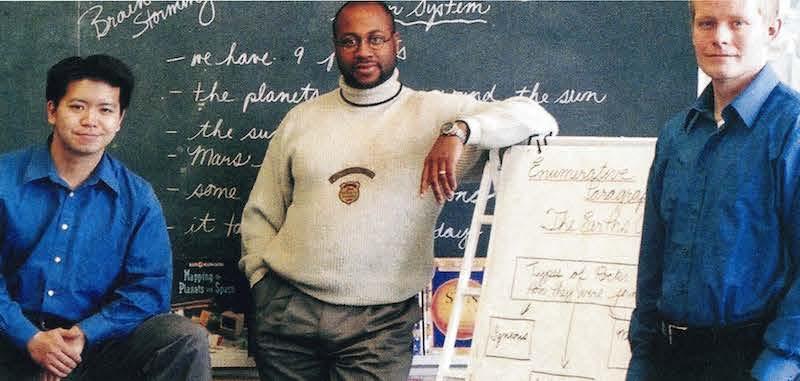
Male Elementary Teachers
In 2001, as part of M.Ed. thesis, I studied 18 male elementary teachers to find out what factors influenced their choice of career, what their long term career-aspirations were and what concerns, if any; they had about their roles. This article summarizes my findings.
Motivation and Career Choices
Most of my respondents teach in the elementary panel because they enjoy working with children. Family influences were not, however, a factor.
The influence of male teachers in the respondents* schooling was interesting Those who had had male classroom teachers themselves voiced varying opinions on their effectiveness and the impact these male teachers had on their lives. Some found them inspirational and said they provided good role models for them; others felt they either made no difference to them or that they were poor role models.
However, study participants who did not have male teachers in their schooling all wished they had.
Perhaps men who had male teachers thought it quite normal and attached no significance to it, evaluating them as teachers and individuals and not considering gender to be a factor. On the other hand, those who did not have male teachers may have felt they missed something and, in the absence of experience, concluded that a male teacher would have benefited them.
Whether they had male teachers or not, the majority of men in this study believed in the necessity and importance of getting more male teachers into the elementary grades. They cited single-parent families and the lack of positive male influences in the lives of children as the main reasons. In fact, fully 50 percent of the teachers in this study chose teaching elementary children as a career because they wanted to fill this perceived gap in some children's lives.
Job Satisfaction and Career Aspirations
Job satisfaction was high among respondents. The teachers felt their jobs were important, challenging and rewarding. Though they were concerned that the job w^as tiring and becoming more stressful, all felt at least somewhat satisfied with their career choice. Levant (1995) asserted that men must find their work meaningful and enjoy it to feel good about themselves.
He also believed, however, that societal pressures of achieving status and wealth still drove men to seek high paying, high powered professions. All of the teachers studied felt either somewhat or very successful as men, both in their careers and in society. The extrinsic rewards of money and status seemed to be outweighed by the intrinsic rewards of their work, despite feeling they were judged by society according to their wealth and position in the world of work.
Half the male teachers surveyed were considering careers in administration. Though these respondents were somewhat younger, age was not a significant factor. They felt that administration would be interesting and challenging for them. None said they wanted to enter administration because it was a more “masculine*5 job. They also believed they would be teaching for approximately 10-15 years before they would attain an administrative position. Attending professional development workshops and taking on more responsibilities at school were the main strategies they were using to reach their career goals.
Though the number of men interested in administration is not overwhelming, it is significant because there are so few male teachers to begin with. For the sake of argument, if half of all the male teachers in Ontario (33 per cent of the provincial workforce in grades kindergarten to 13 [Partridge, 1999]) eventually left teaching to become administrators, the impact would be widespread. Not only would the number of men in elementary classrooms continue to diminish, but there also would be fewer experienced male teachers to mentor younger male teachers. Montecinos and Nielsen (1997) suggest that male elementary education students should be mentored with experienced male teachers since they can serve as role models and share valuable insights. Fewer older male elementary teachers could also perpetuate sex role stereotyping. Both children and male student teachers alike may view elementary education as something which young men do for a short period of time until they move on to “better positions.”
Masculinity and Elementary Teaching
Participants felt, unanimously, that their masculinity was not in question by anybody. In fact, most of them did not even consider their jobs to be “non-traditional” male positions. Even though the majority of elementary teachers are women, the men in this study did not feel out of place in the schools in which they worked. None of them mentioned that they felt isolated in the staff room or at staff parties by their predominantly female co-workers. Also, working mainly with women did not significantly enhance or diminish their job satisfaction. None of them felt that their masculinity was in question because they worked in the elementary panel.
This sense of security about themselves and their roles as elementary teachers could be explained by their definitions of successful teachers and their understanding of masculinity': Respondents believed that being understanding, patient, kind and cooperative were traits found in both successful teachers and “masculine” men. They also felt that being macho, heterosexual and authoritarian were not necessary traits for either the successful teacher or the masculine man. They did not feel there was a conflict between their masculinity and their ability to teach in the elementary panel As men, they felt it was important for their students to see them as responsible citizens who were-interested in their lives and wanted to help them.
Fear of False Accusations
The majority of the teachers in this study were either somewhat or not at all afraid of being accused of the sexual abuse of their students. Their fears were not as strong as Partridge (1999) had reported in her research. They did admit, however, that they were concerned about the issue and were cautious when interacting with the children in their classes. Most felt they had been sufficiently informed by their federation and faculties about how to protect themselves from false accusations. The main strategies they implemented were keeping their doors open and never being alone with students.
Conclusion
The men in this study were quite satisfied with their jobs as elementary teachers. They were confident in their abilities and seemingly unfazed by societal norms, pressures and gender expectations to work in a more male dominated profession. They do not believe that their jobs are “non-traditional” male positions, and they do not judge their success as men by the status or wealth they have attained. They do not appear to be uncomfortable in their schools, and they do not work in fear of false accusations against them.
The fact remains, however, that fewer men are becoming elementary teachers. Both administrators and parents recognize the need for males to be role models for, and part of the lives of, young children. The challenge for faculties of education, school boards and society at large is how to recruit men into the profession.
Montecinos and Nielsen (1997) found that men tend to choose elementary education as a career after an intervening experience working with young children. If more men had the opportunity to work with young children before they entered university, they might perhaps consider teaching in the future.
A revisit of Herbert’s (1986) three basic stages of career development may further this hypothesis. Stage two, the exploration stage, occurs between the ages of 11 and 17 when tentative choices are made on the basis of interests, abilities and values. If males of high-school age were to gain experiences working with young children through cooperative volunteer work for credit within elementary schools, then more men might be attracted to the profession, and more might remain. Then, when they enter the preparation stage of career development at the age of 17, the option of teaching elementary aged children might not seem so unusual.The stereotypes and prejudices about teaching may not have as much impact once they have discovered the joys of working with young children.
Are these men different from the average man in some way, or have they simply discovered the joys of working with children? It is possible that DeCourse andVogtle’s (1977) observations that males have begun choosing careers stressing service to society and personal satisfaction over extrinsic rewards could be manifested in these men. Perhaps sex-role stereotyping is finally being diluted, thus making it possible for men to work with young children without suspicion or criticism.
School boards could also look to the traditional male professions to recruit men to the elementary teaching ranks. As Anderson and Hayes (1998) reported, some men abandon their original goals and dreams to pursue jobs providing them with wealth and status. After a while, they become discouraged and begin looking for careers that offer personal satisfaction and a feeling they are making a positive difference in the lives of others. Anderson and Hayes recounted stories of various men who had left their original fields for other positions that gave them more satisfaction. One story concerned a lawyer who left his practice to pursue a career teaching college students. He said he felt more appreciated by his students than he ever had by his clients. Another story was about an accountant who began coaching children’s basketball teams in an effort to give his life meaning. Likely there are men who are looking for change of profession and who might consider elementary education as a viable option.
Another challenge is keeping men in the classroom. A disproportionate number of men show an interest in administrative positions. It remains unclear why men want to leave the classroom to pursue becoming a program leader, principal or superintendent. DeCourse and Vogtle’s (1997) claim that men are given preferential treatment and are encouraged by administrators to move up the educational hierarchy may be the most plausible reason. Though none of the men in this study acknowledged they were being encouraged to do so, perhaps there is “invisible pressure” by their administrators, something that DeCourse and Vogtle (1997) alluded to as well. It must be said that men’s desire to become administrators is not a negative trait. It is simply disappointing that there are not more men in the elementary panel who choose to remain in the classroom.
Jeffrey Crane teaches grade 3 at Dunlace Drive Public School Toronto, He is one of approximately 12,000 male teachers and occasional teachers who belong to ETFO and teach grades kindergarten to 8 in Ontario's public elementary schools.
References
Anderson. D.Y. and Hayes. C.L. Gender Identity and Self-Esteem: A New Look at Adult Development. Springer Publication Co. New York, 1996.
DeCourse, C.J. and Vogtle, S.P. "In a Complex Voice: The Contradictions of Mate Elementary Teachers' Career Choice and Professional Identity." Journal of Teacher Education. 48(1). January-February 1997'.
Herbert, D. "Career Guidance, Families and School Counsellors. Highlights: An ETiC/CAPS Digest." ERIC Document Reproduction Services No. ED279991.
Levant, R.F Masculinity Reconstructed. Penguin Books, Ltd. New York. 1995. Montecinos, C, and Nielsen, L.E. "Gender and Cohort Differences in University Students' Decisions to Become Elementary Teacher Education Majors." Journal of Teacher Education. 48(1).
Partridge, K, "A Few Good Men: What Kids Lose When Male Teachers Disappear From Their Classrooms?" Today's Parent February. 1999.

